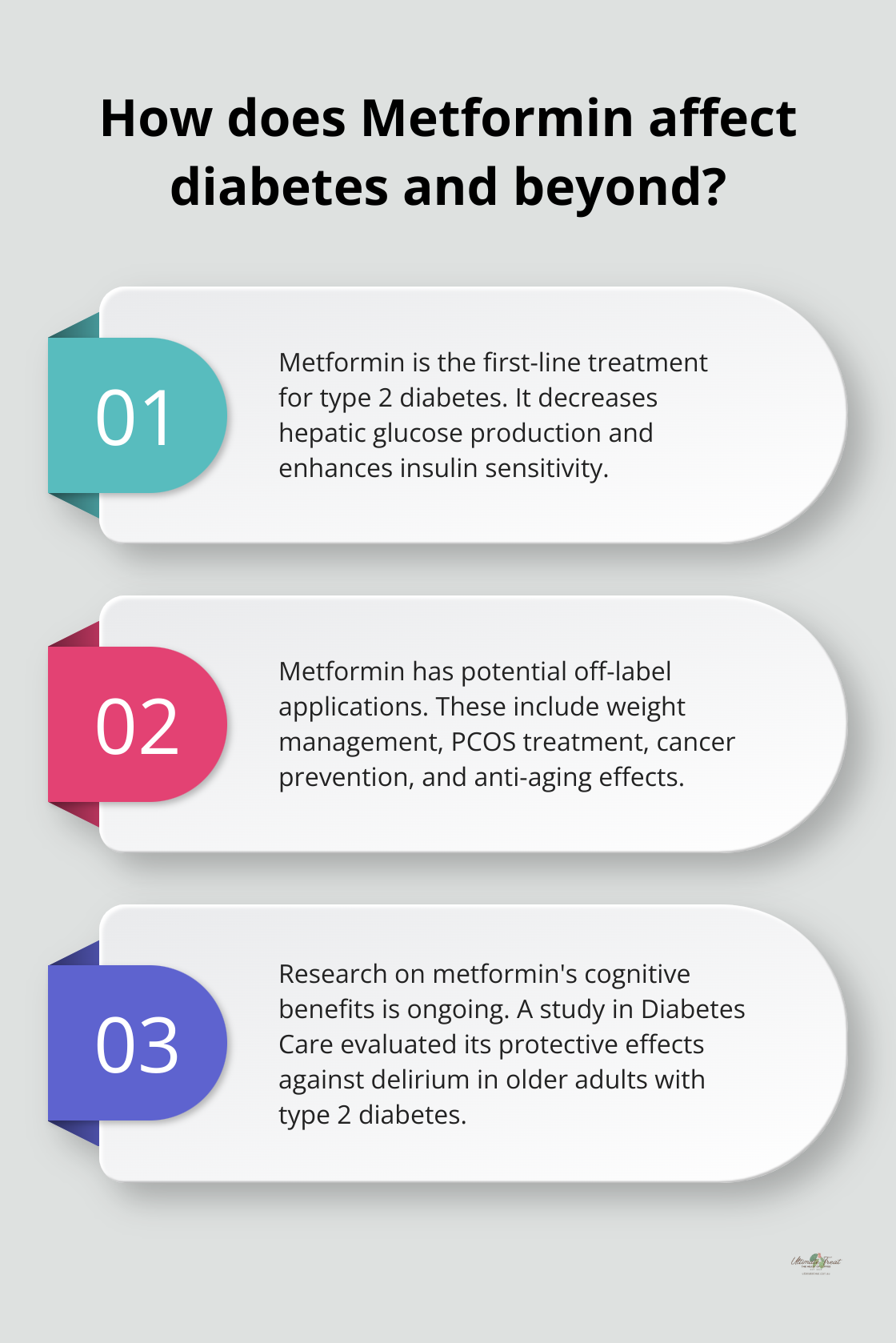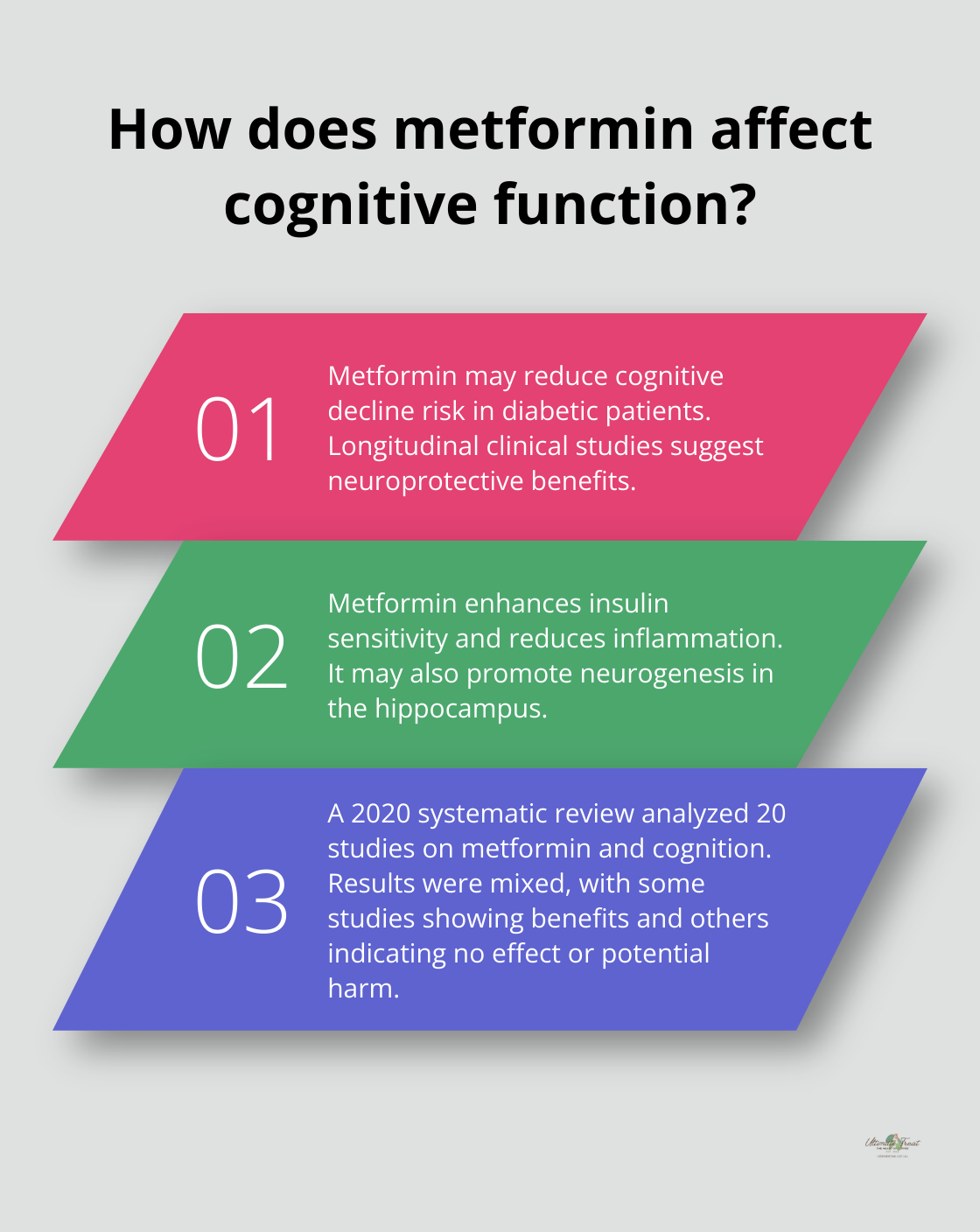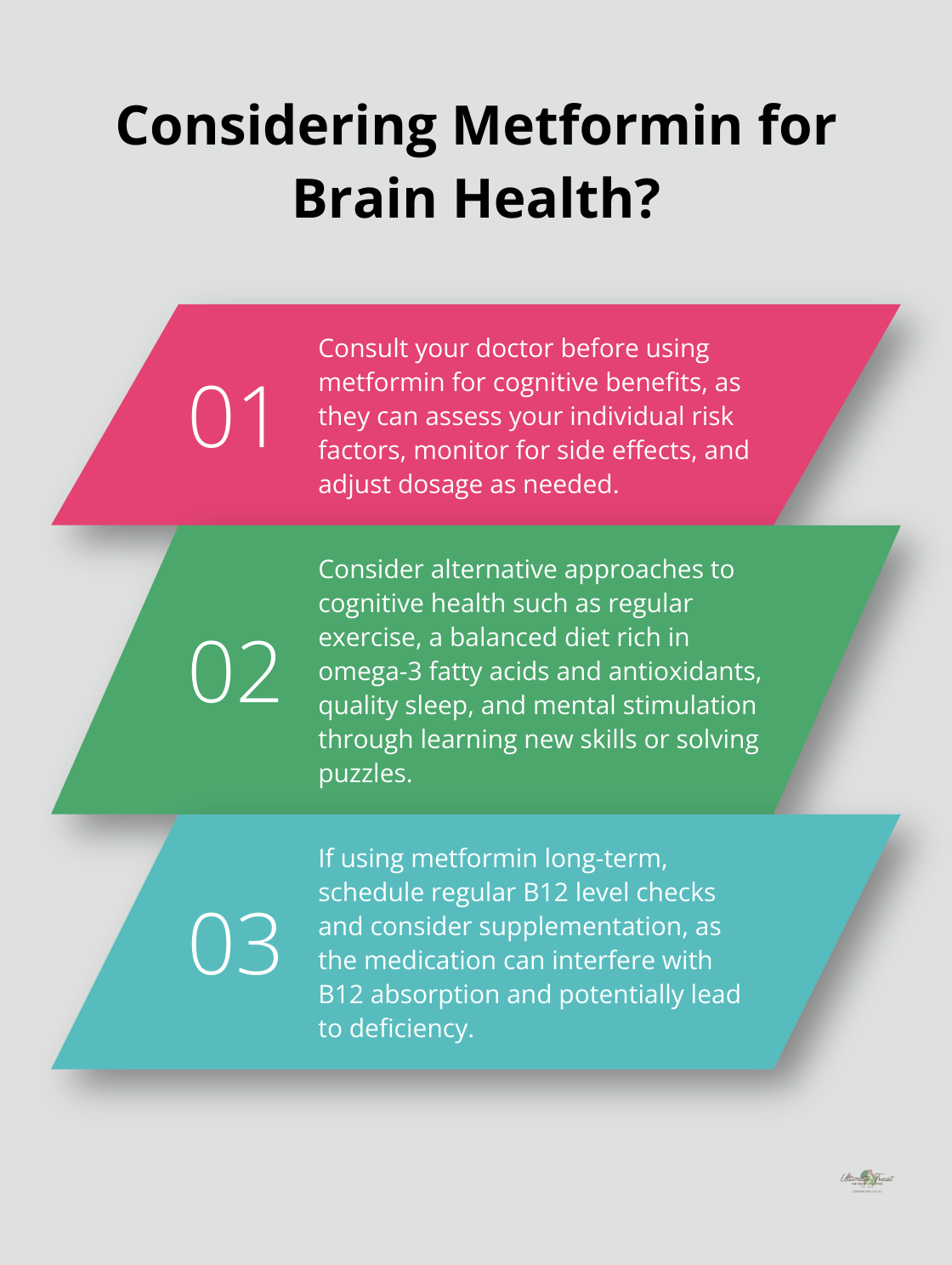At Ultimate Treat, we’re always exploring new frontiers in health and wellness. Metformin, a medication traditionally used for diabetes management, has recently garnered attention for its potential cognitive benefits.
The link between Metformin and mental clarity is an exciting area of research that’s sparking interest among scientists and health enthusiasts alike. In this post, we’ll examine the latest findings and what they could mean for brain health.
What is Metformin?
Metformin stands as a widely prescribed medication that has become a cornerstone in diabetes management for decades. This drug, originally developed from the French lilac plant, is now the first-line treatment for type 2 diabetes due to its effectiveness and safety profile.
Metformin’s Role in Diabetes Management
In diabetes care, metformin decreases hepatic glucose production by suppressing gluconeogenesis and enhancing insulin sensitivity. This dual action lowers blood sugar levels without causing hypoglycemia, a common concern with other diabetes medications. The American Diabetes Association recommends metformin as the initial pharmacologic agent for type 2 diabetes treatment.
Exploring Metformin’s Off-Label Potential
In recent years, a surge of interest has been witnessed in metformin’s off-label applications. Researchers investigate its effects on various health conditions, including:
- Weight Management: Some studies suggest metformin may aid in weight loss, particularly in individuals with insulin resistance.
- Polycystic Ovary Syndrome (PCOS): Doctors sometimes prescribe metformin to manage PCOS symptoms and improve fertility.
- Cancer Prevention: Preliminary research indicates metformin might reduce the risk of certain cancers (though more studies are needed).
- Anti-Aging: Growing interest surrounds metformin’s potential to slow aging processes and extend lifespan.
Metformin and Cognitive Health
Perhaps most intriguing is the emerging research on metformin’s impact on brain health. A study published in Diabetes Care aimed to evaluate the protective effects of metformin against delirium in older adults with type 2 diabetes. However, these findings remain preliminary and require further investigation.
Caution with Off-Label Use
While the potential benefits of metformin excite many, it’s essential to approach off-label use with caution. Always consult with a healthcare professional before considering metformin for non-diabetes purposes.

As research continues to uncover new possibilities for metformin, the next section will explore its potential impact on cognitive function in greater detail.
How Does Metformin Affect Brain Function?
Metformin’s Neuroprotective Potential
Recent research suggests metformin may offer neuroprotective benefits. Longitudinal clinical studies have indicated that metformin may reduce the risk of cognitive decline in diabetic patients.
Proposed Mechanisms of Action
Scientists propose several ways metformin might influence brain function:
- Insulin Sensitivity Enhancement: Metformin improves insulin sensitivity, potentially regulating glucose metabolism in the brain and protecting against cognitive decline.
- Inflammation Reduction: The drug exhibits anti-inflammatory effects, which could protect brain cells from damage.
- Neurogenesis Promotion: Animal studies indicate metformin might stimulate new brain cell growth, particularly in the hippocampus (a region vital for memory and learning).
Clinical Studies: A Mixed Picture
Evidence remains inconclusive despite promising results in some studies. A 2020 systematic review in the Journal of Alzheimer’s Disease analyzed 20 metformin and cognitive function studies. The review revealed mixed outcomes, with some studies showing cognitive benefits and others indicating no significant effect or potential harm.

For example, a 2017 study in Diabetes Care found that older adults with diabetes who took metformin for over six years performed worse on cognitive tests compared to non-users. These conflicting results underscore the complexity of metformin’s effects on the brain and the need for further research.
Practical Considerations for Metformin Use
If you consider metformin for potential cognitive benefits, keep these points in mind:
- Medical Supervision: Never start metformin without consulting your doctor, especially if you don’t have diabetes.
- B12 Monitoring: Long-term metformin use can lead to vitamin B12 deficiency (which can affect cognitive function). Regular B12 testing is advisable.
- Health Assessment: Metformin’s effects may vary based on age, diabetes status, and overall health.
- Research Updates: Stay informed about new studies in this area as our understanding of metformin’s cognitive effects continues to evolve.
The potential cognitive benefits of metformin intrigue researchers and health enthusiasts alike. However, the mixed results from clinical studies highlight the need for caution. In the next section, we’ll explore metformin’s potential risks and side effects, providing a balanced view of this medication’s impact on brain health.
What Are the Risks of Using Metformin?
Common Side Effects
Metformin can cause gastrointestinal discomfort in some users. A study published in Diabetes Care revealed that approximately 25% of patients experience side effects like nausea, diarrhea, and abdominal pain. These symptoms often subside over time, but they can be bothersome initially.
Vitamin B12 deficiency presents another concern. Long-term metformin use can interfere with B12 absorption. Regular B12 monitoring and supplementation may become necessary for long-term users.
Cognitive Health Considerations
The impact of metformin on cognitive health presents a complex picture. Some studies suggest potential benefits, while others raise concerns. A study in Diabetes Care found that older adults with diabetes who used metformin for over six years performed worse on cognitive tests compared to non-users.

Recent research suggests that metformin use is not associated with hyperlactatemia or lactic acidosis in patients with type 2 diabetes.
Importance of Medical Supervision
Medical supervision becomes essential when using metformin, especially for off-label purposes like cognitive enhancement. Your healthcare provider can:
- Assess your risk factors
- Monitor for side effects and adjust dosage as needed
- Conduct regular blood tests to check B12 levels and kidney function
- Evaluate potential drug interactions
Discuss metformin with your doctor if you consider it for cognitive health. Based on your health profile, they can help weigh the potential benefits against the risks.
Alternative Approaches to Cognitive Health
While metformin shows promise, other approaches to cognitive health exist. These include:
- Regular exercise (which improves blood flow to the brain)
- A balanced diet rich in omega-3 fatty acids and antioxidants
- Quality sleep (essential for memory consolidation)
- Mental stimulation through learning new skills or solving puzzles
Some individuals also turn to natural supplements for cognitive support. For example, Ultimate Treat offers a premium organic coffee blend infused with Chaga and Lion’s Mane mushrooms, which may support mental clarity and focus.
Weighing the Options
The decision to use metformin for cognitive health requires careful consideration. While it shows potential, the risks and side effects cannot be ignored. Always consult a healthcare professional before starting any new medication or supplement regimen. They can provide personalized advice based on your health history and current condition.
Final Thoughts
Metformin and mental clarity research presents an intriguing avenue for scientific exploration. Studies yield mixed results, highlighting the complex relationship between this diabetes medication and cognitive function. Potential benefits must be weighed against risks, and any consideration of metformin for cognitive health requires thorough consultation with healthcare professionals.

The scientific community continues investigating metformin’s cognitive effects, which may lead to new applications or inspire similar compounds. Individuals seeking to support their mental clarity have other options to explore. Ultimate Treat offers a premium organic coffee blend infused with Chaga and Lion’s Mane mushrooms, designed to enhance mental focus.
A holistic approach to brain health includes a balanced diet, regular exercise, quality sleep, and mental stimulation. These lifestyle factors, combined with appropriate medical care and potentially beneficial supplements, can help optimize mental clarity and overall brain health. The future of metformin research holds promise for unlocking new insights into cognitive function and aging.



